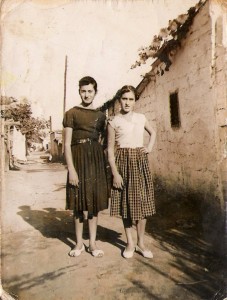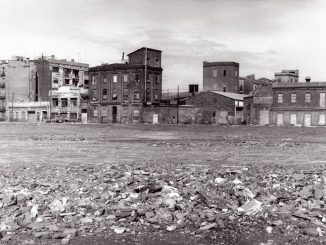
big events

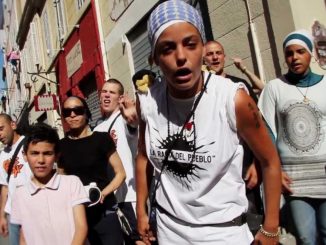
Crossing the capital of culture: summer in Marseille
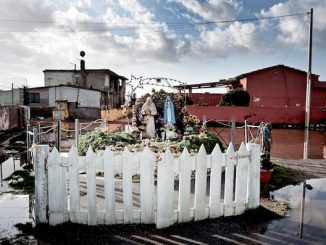
The Idroscalo, a self-grown neighborhood on the coast of Rome

Second International Conference on Anthropology and Urban Conflict
After the success of the First International Conference on Anthropology and Urban Conflict in Barcelona in november 2012, the second conference is being hold now in Rio de Janeiro, and organized together by Barcelona-based OACU and Rio de Janeiro’s Laboratorio de Etnografia Metropolitana. As posted on the Conference’s webpage, “Just as the catalan experience of 1992 Olympic Games was frequently pointed as the source of inspiration for the current context in Rio, the academic production of brazilian and foreign researchers is allowing us to challenge the very construction of the “Barcelona model”, by showing its perverse social impacts which are the results of the processes of the internationalization and mercantilization of cities…”.
- II Jornadas Internacionais de Antropologia do Conflito Urbano, from August 11th to 13th, Rio de Janeiro :: program :: talk on the impacto of the Olympics in Bcn and Río [article] [video]
- Dossier “Antropologia del Conflicto Urbano” in Quaderns-e del ICA n.19(1)2014.
- Something from Brazil: Short computer animation movie about How to prepare the World Cup :: Documentary Every Map Holds A Discourse, by Francine Albernaz and Thaís Inácio, about autonomous cartography in the favelas :: Observatório de Favelas webpage :: and the article by Marcelo Baumann Burgos et al. “O efeito UPP na percepcão des moradores das favelas” (2011)
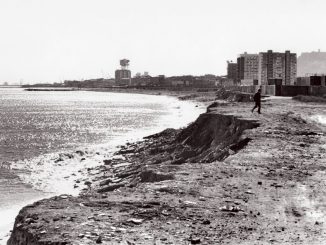
We have always been a frontier: Icària neighbourhood, before becoming the Vila Olìmpica

WHOSE megaevents?
Who were London 2012 Olympic Games for? Were they for the athletes, the sponsors, the organizers, the global audience? Or were they for us? Our friend Gynna Millan (from UCL Development Planning Unit; in 2009 she presented a proposal for Repensar Bonpastor competition), together with a group of video enthusiasts, studied the impact of the “greatest event on earth” on public spaces, parks and local communities in London. The result is a video archive available on Whose Olympics? website, and a short documentary [watch trailer]. Two years later, we can ask again: who will Brasil’s 2014 World Cup be for? “The world cup is not ours“, write these architects from Río Grande do Sur, quoting Plato. These megaevents are transnational, as the protests they elicit. But the discourse of globalization, that transforms any local event in just another chapter of the same story, it’s not our own either. As we discussed in a recent OACU meeting in Barcelona (where, obviously, we have the precedent of 1992’s Olympics), we are much more interested in differences than in similarities. Anthropology has to keep an eye on correspondences and interrelation on the “macro” level, but it explores mainly the local articulations, what is unmeasurably “micro”: all that can’t be compared, all that is specific to each story, place, events, and to the impact of each phenomenon on every particular territory.
- “Whose world cup?“, campaign of the Comités populars da copa (Ancop), and video “Who wins with this game?”, on the Observatório das metrópoles website. “Is the world cup ours?“, Jessica D’Elias study about evictions in Itaquera (Sao Paulo), on Rachel Rolnik blog :: “A Caminho da Copa“, videodocumental, 2012.
- Luís Edoardo SOAREZ, brazilian anthropologist: “What I know and what I don’t know about the protests in Brazil“ [in italian in NapoliMonitor] :: Raúl Zibechi, Uruguayan journalist: “Why is the World Cup indignant“, LaVaca.com
- Big sport events and human rights violations in Brazil: article by Fabiola Ortiz on PeriodismoHumano.com, and interview with Sonia Fleury on Brasildefato, about the Dossier prepared by the Comités popular da copa [PDF] :: Article and videointerview with the economist and sociologist Carlos Vainer, about conflicts related with big events. Note the reference to the transformation of Barcelona.
- Mauro Castro COMA (2012) “From the Olympic dream to the Porto Maravilha project: ‘eventism’ as a catalyzer for regeneration”. Urbe, v.3, n.2. [PDF] :: Magrinyà and Maza (2005) “Tinglados de Bar-ce-lo-na: la incorporación del puerto”, Scripta Nova, 139 [link] :: and don’t miss this jewel: “Barcelona Brasil group: Bcn is our inspiration and Maragall my idol“.
- Letizia GIANNELLA, Brazilian geographer in Barcelona: Some thoughts about the protests (2013) on Manuel Delgado’s blog.
- An article by Nazaret Castro about the World Cup and the Olympic Games in Río, in Intensificant vides nervioses blog (very much related to ours)

Once we made news: the forgotten battles
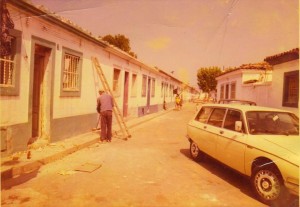 It is been decades now that in Barcelona whole neighborhoods are demolished without the media even mentioning them any more. If someday these situations "made news", soon oblivion covers back their memory. A recent example was Can Tunis neighborhood, whose demolition was surrounded by silence in summer 2004; but in 1993, another neighborhood in the same Zona Franca district, the cases barates of Eduard Aunós fell leaving almost no trace in the city collective memory. The media were too busy celebrating the success of the Olympic Games, as well as years later they were covering the 2004 Universal Forum of Cultures. A group of former inhabitants of Eduard Aunós have found this old reportage: it reminds us a forgotten battle, astonishingly similar to the one now taking place around the demolition of anouther group of cases barates: Bon Pastor. Someday, this one too will be forgotten.
It is been decades now that in Barcelona whole neighborhoods are demolished without the media even mentioning them any more. If someday these situations "made news", soon oblivion covers back their memory. A recent example was Can Tunis neighborhood, whose demolition was surrounded by silence in summer 2004; but in 1993, another neighborhood in the same Zona Franca district, the cases barates of Eduard Aunós fell leaving almost no trace in the city collective memory. The media were too busy celebrating the success of the Olympic Games, as well as years later they were covering the 2004 Universal Forum of Cultures. A group of former inhabitants of Eduard Aunós have found this old reportage: it reminds us a forgotten battle, astonishingly similar to the one now taking place around the demolition of anouther group of cases barates: Bon Pastor. Someday, this one too will be forgotten. 
The Pinheirinho massacre
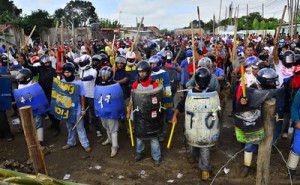 In the morning of january 22nd, 2012, 2000 military police broke into the Pinheirinho settlement in Sao Paulo (Brasil) with helicopters, tanks, horses, tear gases, and began the eviction. Almost 10.000 people had been living there for about 8 yeras; they had just regularized their housing titles. But the eviction was promoted by a company whose director fled the country in 1990 for finantial crimes, and that now needs the land to speculate, keeping them empty. In preparation of 2014 World Cup and 2016 Olympic Games, some 170.000 people are under eviction all around Brasil. Residents of Pinheirinho strenuously resisted the eviction, that ended with 7 dead, and tens of wounded and arrested. Public houses had been promised to the evicted, now stacked in churches or gyms; but "those in charge of building social houses are part of the same bloodthirsty, prejudiced and deceitful elites as the governants..."
In the morning of january 22nd, 2012, 2000 military police broke into the Pinheirinho settlement in Sao Paulo (Brasil) with helicopters, tanks, horses, tear gases, and began the eviction. Almost 10.000 people had been living there for about 8 yeras; they had just regularized their housing titles. But the eviction was promoted by a company whose director fled the country in 1990 for finantial crimes, and that now needs the land to speculate, keeping them empty. In preparation of 2014 World Cup and 2016 Olympic Games, some 170.000 people are under eviction all around Brasil. Residents of Pinheirinho strenuously resisted the eviction, that ended with 7 dead, and tens of wounded and arrested. Public houses had been promised to the evicted, now stacked in churches or gyms; but "those in charge of building social houses are part of the same bloodthirsty, prejudiced and deceitful elites as the governants..."
- Video documentary: "Pinheirinho: a verdade nao mora ao lado", by Coletivo de Comunicadores Populares; and a reflection on the role of independent journalism.
- Brigadas Populares, Justiça Global, Comunidades e Movimentos contra a violência, "Pinheirinho: a first narrative of institutional violence" [PDF]
- More news: Eviction of Pinheirinho settlement [vídeo] :: "Who gained with the massacre?" [article in Brasil Indymedia] :: Ten lies about Pinheirinho [article in OutrasMídias] :: A week after the massacre [artículo] :: Right, state and terror in the case of Pinheirinho [artículo en A arma da crítica] :: Communiqué of Comitês populares de Copa :: A week before the eviction [text Alliance of Inhabitants]
- Dossier: "Big events and human rights violations in Brazil" [download PDF]
- See also the Grupo de Geografía Crítica Radical (GESP)'s webpage, from University of Sao Paulo

Istanbul, a city without limits. Documentary movie
 "In Istanbul, we crossed the ecological limits, crossed the population limits, crossed the ecological limits. If you ask me where it is all going to lead, I will quote from Doğan Kuban: chaos" Mücella Yapıcı, chamber of architecture of Istanbul.
"In Istanbul, we crossed the ecological limits, crossed the population limits, crossed the ecological limits. If you ask me where it is all going to lead, I will quote from Doğan Kuban: chaos" Mücella Yapıcı, chamber of architecture of Istanbul.
- Ekümenopolis: Ucu Olmayan Şehir (Ecumenopolis: City Without Limits) (2011) a movie by Imre Azem, will be in Barcelona on november 15th, 8pm at Traslaciones festival in CCCB. Director Imre Azem will participate in the debate Istanbul relatos fuera de campo on wednesday 16th at 7:30pm. [Trailer1] [Trailer2] [Web]

Photos: Barcelona’s Montjuïc
Four photos of Montjuïc mountain, when there still were people living on it. Even if for history it was only “slums”, many of them remember houses, written records, roads and street numbers. These photos come from private collections of former residents of “Eduardo Aunós” neighborhood. The old slum dwellers, almost all of them from Murcia or Andalusia, had to leave their houses in the 1920s, because of the celebration of an Universal Exposition. They were relocated in the Casas Baratas, but then their sons and nephews were evicted again at the end of the century. The need for land hit again those immigrant families; and it doesn’t matter how many generation they had been living in their “welcoming land”.…

The “Bachillera” and the struggle against gentrification in Seville
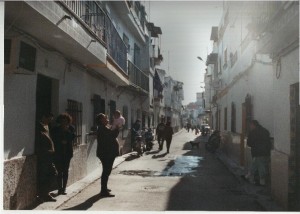 Just as in Barcelona, gentrification arrived to Seville in the eighties, when the city began to prepare for Expo '92. But the struggles and mobilization against real estate speculation didn't begin until the decade of 2000. The Bachillera, a neighborhood of self-constructed houses in Macarena district, historically was in the outskirts of the city, but with the Expo entered in a "new central area". Residents own the houses, but the lands belongs to the Sevillan Charity Association, who wanted to demolish the entire neighborhood. The initial demolition plan was blocked through the collaboration of neighbors and activists/technicians, that managed to get involved in a rehabilitation project for the neighborhood. Neighborhood assemblies were held, then participative workshops, door-to-door enquiries, a consensual diagnosis of the neighborhood, and even a 15 days occupation in the headquarters of the Sevillan Charity Association.
Just as in Barcelona, gentrification arrived to Seville in the eighties, when the city began to prepare for Expo '92. But the struggles and mobilization against real estate speculation didn't begin until the decade of 2000. The Bachillera, a neighborhood of self-constructed houses in Macarena district, historically was in the outskirts of the city, but with the Expo entered in a "new central area". Residents own the houses, but the lands belongs to the Sevillan Charity Association, who wanted to demolish the entire neighborhood. The initial demolition plan was blocked through the collaboration of neighbors and activists/technicians, that managed to get involved in a rehabilitation project for the neighborhood. Neighborhood assemblies were held, then participative workshops, door-to-door enquiries, a consensual diagnosis of the neighborhood, and even a 15 days occupation in the headquarters of the Sevillan Charity Association. 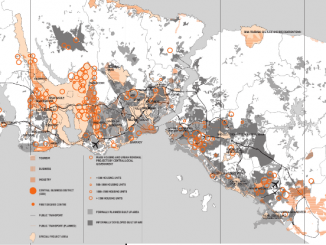
Istanbul: living in voluntary and involuntary exclusion

Naples, 2013 Forum of Cultures
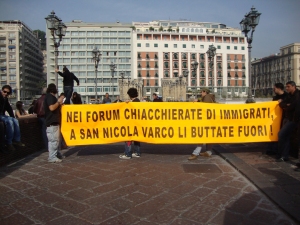 "The first edition of the Forum of Cultures, in Barcelona in 2004, was a failure: the ambitious program of cultural events served only as a cover for a huge speculative operation on the popular neighborhood of Poblenou and on the city coast. In the same way in Naples, Forum 2013 will be the Trojan horse through which heavily revalorize for tourism and real estate the city's historical center and the area of Bagnoli, speeding up the expulsion of the low-income classes towards the peripheries, and to increase constructions on the coast of Coroglio".
"The first edition of the Forum of Cultures, in Barcelona in 2004, was a failure: the ambitious program of cultural events served only as a cover for a huge speculative operation on the popular neighborhood of Poblenou and on the city coast. In the same way in Naples, Forum 2013 will be the Trojan horse through which heavily revalorize for tourism and real estate the city's historical center and the area of Bagnoli, speeding up the expulsion of the low-income classes towards the peripheries, and to increase constructions on the coast of Coroglio".
- Critical webpage against Naples 2013 Forum
- Declaration of the IX Congress of the Federation of Anthropological Associations of the Spanish State, FAAEE, 2002) about Barcelona's Fòrum de las Culturas 2004 PDF
